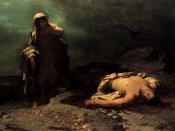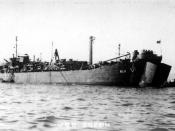Nomos versus Physis in Sophocles' Antigone
Sophocles' dramatic masterpiece Antigone centers around the conflict between Antigone and Creon on many different levels, all of which contribute to the philosophical war between the two characters. Most of the action revolves around Antigone and her beliefs. One of the most notable conflicts is that of mortal duties opposing divine duties, or more clearly, state law (nomos) versus moral law (physis). Antigone feels that moral obligations and sacred traditions are much stronger than any responsibility that a man could create while Creon affirms that loyalty to the state, and consequently to his laws, overrules all other allegiances. This is Antigone's play because there would be no conflict without her and her law-breaking behavior. However, it is Creon's tragedy because it is his tragic flaw that brings about the confrontation of their opposing beliefs.
Creon's tragic flaw, which ultimately leads to his and the city's downfall, is his desire for pure and complete order.
The people of Thebes "must stand on the side of what is orderly" according to Creon and any behavior that falls below his high standards could be detrimental to the entire city (line 687). He feels that only the king knows what is best for his kingdom and that "there is nothing worse than disobedience to authority" (671). Having grown up in a ruling family, Creon understands that a city in disarray is a sick city, and a sick city cannot survive. Therefore, one of the reasons he takes on the responsibility of king is to restore order to Thebes. The way in which Antigone openly and proudly disobeys his proclamation is a flagrant rejection of what Creon stands for. He allows this state crime to influence the rest of his actions throughout the play and he loses...


